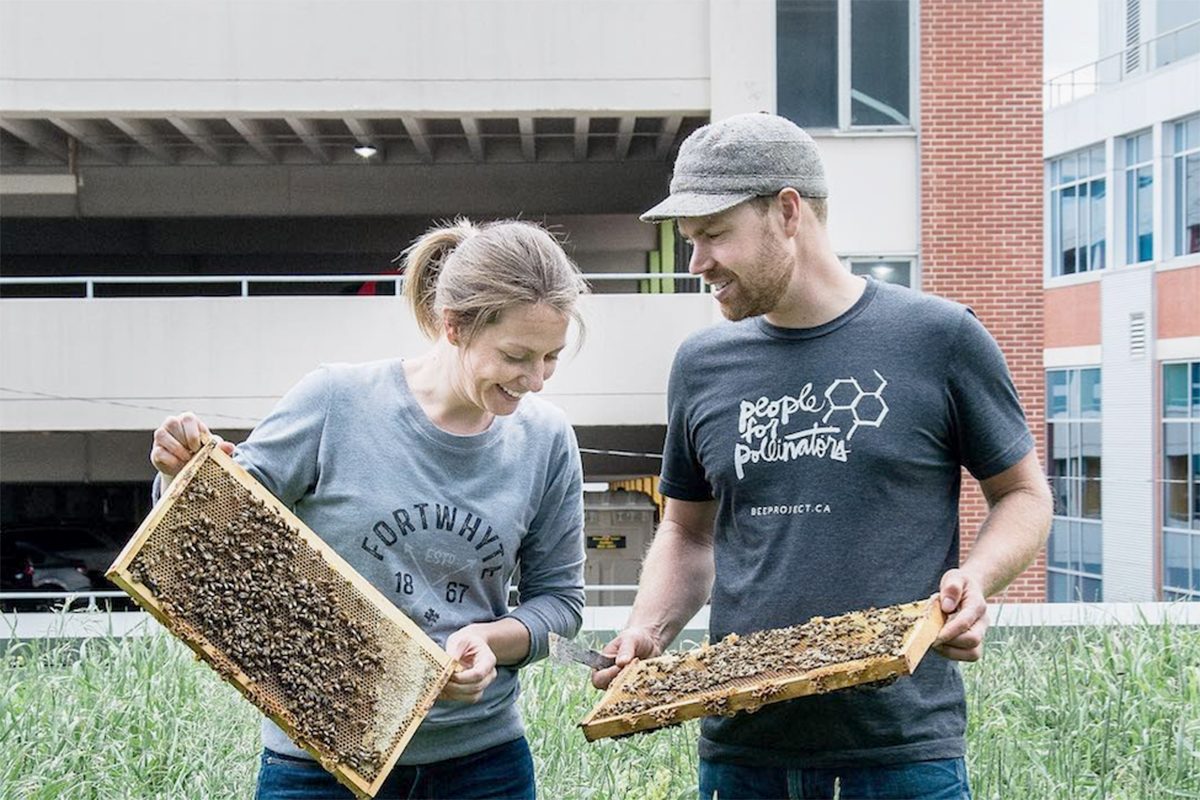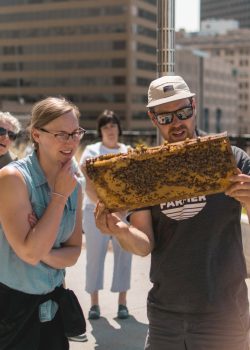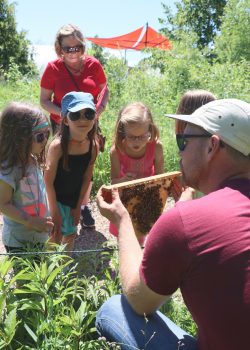
Lindsay Nikkel and Chris Kirouac are the founders and owners of BeeProject Apiaries. // Photo from Sara Sealey
Trailblazer Talks: It’s not about the honey
BeeProject Apiaries are regulars of Winnipeg’s pop-up market scene, and at first glance, you might think they’re there to sell honey.
On display are jars of the stuff in varying golden hues, including their popular Neighbourhood Honey harvested from across Winnipeg. But the sweet treat is a byproduct of their true raison d’etre: getting you to care about bees.
Owners Lindsay Nikkel [BN/06] and Chris Kirouac [BN/06] are trying to help the world out of a sticky situation: almost three quarters of crops depend on bees and other pollinators to produce our food, but those populations are sharply declining.
Last year, Canada reported the highest loss of bees in nearly a decade. If you’re eating right now, take note: one in every three bites Canadians take is made possible by pollinators like bees.
“There’s a big misconception that we’re just worried about honey,” Kirouac says. “People aren’t thinking about food production and food security.”
With concerns like these, you might be surprised that Kirouac and Nikkel are nurses. The husband-and-wife duo met as students at the U of M but changed day-jobs when Kirouac took the university’s “Beekeeping for the Hobbyist” course out of curiosity.
“Chris kept saying to me ‘we need to get a hive’,” Nikkel says. “I thought, ‘you know what, he just needs to stop talking about it and get one’. We started out with five, which turned into 10, then 20. All of a sudden, we had 140 hives in the country. This was no longer a hobby – we had to make a decision.”
The bees won.
OUT OF SIGHT, OUT OF MIND
Early into their hobby, Kirouac and Nikkel unwittingly broke the law: they installed a hive on their deck in Wolseley before realizing it was illegal. But it gave them pause: wouldn’t it be easier to get people to care about bees if they saw the process happening around them?
After successfully lobbying the city to lift its ban on urban beekeeping in 2017, BeeProject Apiaries adopted an in-your-neighbourhood approach.

Chris Kirouac gives an inside look at Red River College’s rooftop hive to employees. // Photo from Lucas Smith
They have hives in 95 locations around Winnipeg – mainly on rooftops – including Manitoba Hydro, Red River College and CBC Manitoba. In what is essentially a turnkey operation, BeeProject installs and maintains the hives, then delivers the honey (up to 25 kg) at season’s end. They also host workshops for their partners’ employees.
“We get them holding frames of honeybees, pointing out the queen, and they get really excited about what’s happening on their rooftop and what that means in terms of the community around them,” says Nikkel.
“It reminds people that bees are living in and moving through their neighbourhoods, not just pollinating one backyard,” adds Kirouac.
Public health education is an essential part of BeeProject – something they attribute to their nursing background. They see urban beekeeping as a preventative medicine for a variety of issues facing bee populations such as monocultures in industrial agriculture and pesticides.
“We’ve noticed some big parallels [to health care] along the lines of drug resistance from improper or overuse use of pharmaceuticals, or the tendency to look for a quick response to a problem rather than a preventative approach,” explains Kirouac, noting they practice and advocate sustainable beekeeping methods like avoiding antibiotics.
“A lot of old-school beekeepers never went to university; being trained in the scientific process and using evidence-based strategy was a big thing for us.”
BEE EDUCATED
Besides combating the world’s pollination problem, BeeProject is also fighting fake news: bees aren’t aggressive. The number one concern they heard while lobbying city hall was the fear of increased human-bee interaction.
“People think bees are synonymous with wasps but there are pretty major differences,” says Kirouac. For example: “Bees are vegetarian, they’re not after your barbecue chicken.” They sting only as a last resort because they die afterwards, and male bees don’t have stingers, so they’re harmless.
It’s one of the reasons BeeProject expanded their outreach to schools, visiting 40 classrooms in 2018.
“We often bring an observation hive, which is a live hive but it’s enclosed so kids can get up close without any risk of harm,” Nikkel explains. “It’s a really engaging way of getting them talking about how fun bees are.” But her favourite activities are field trips to their hive in Assiniboine Park. “It’s all smiles the whole time. It’s an empowering moment when you get them holding a frame of bees and they’re like ‘I can do this, and I’m not scared.’”
Nikkel and Kirouac live and breathe bees – even describe themselves in honeyed terms. “I would be a creamed honey because I don’t like things messy,” admits Nikkel, who manages BeeProject’s social media and photography. Kirouac, who is often in front of the camera, is buckwheat honey, “complex, dense, with a salty caramel taste. It’s kind of got an overblown personality.”
Their two young daughters are also big fans of bees and their mom’s favourite statistic: “about 98 per cent of bees in the hive are female and they do all the work.” (Come winter, they’re physically kicked out of the hive.)
The family hopes their education will inspire more “bee ambassadors”. Even if people don’t become beekeepers, they can have an impact as citizens, consumers and gardeners.
Grow a variety of plants, which bloom at different times so bees have a continuous food source. Write to politicians about widening bans on pesticides and choose organic treatments for your own yard. Buy local honey instead of the imported grocery store variety which can be laden with contaminants and corn syrup.
It’ll make life that much sweeter – for you, and the bees.
Trailblazer Talks is an introduction to U of M alumni who are tackling global issues, challenging the status quo, and discovering new ways we can live better. Read more from this series here.







